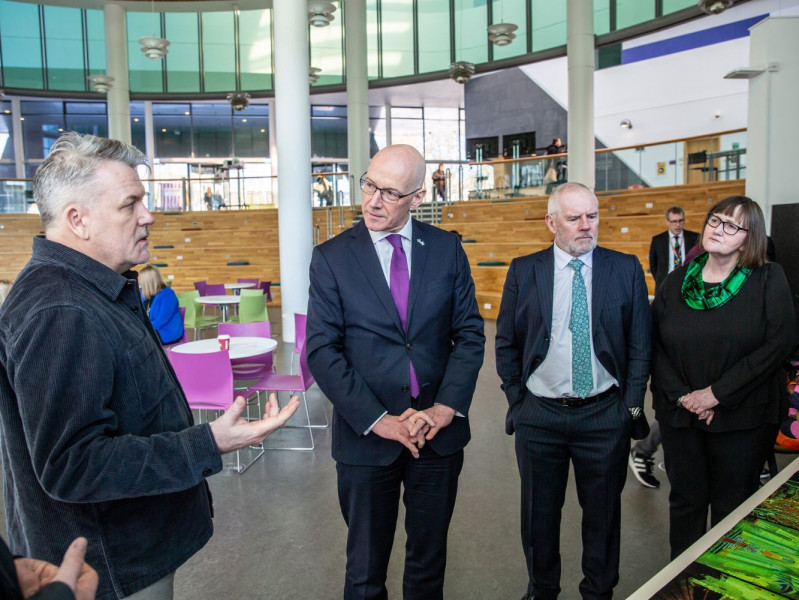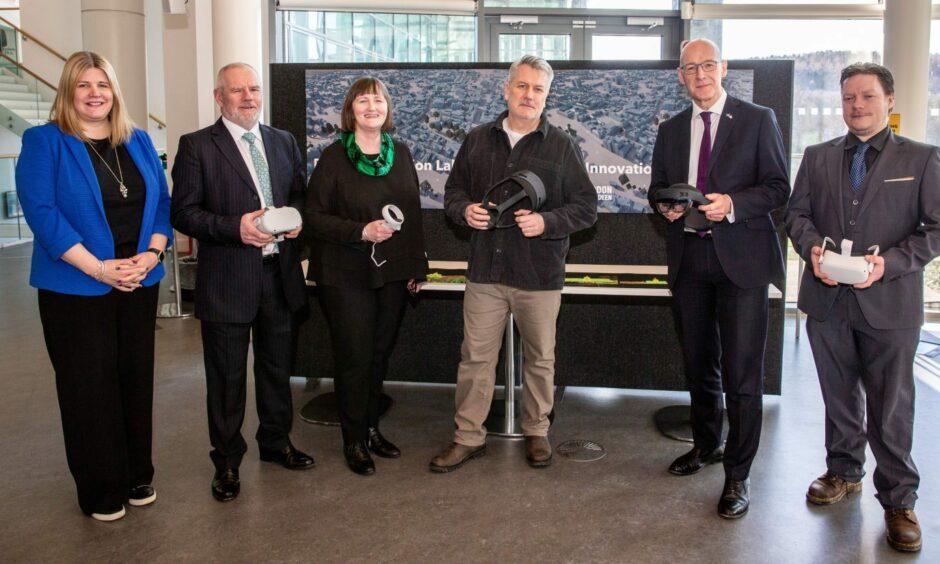Funding success for Digital Innovation Lab as Deputy First Minister visits RGU
Thursday 09 March 2023

The project has been announced during a visit to the University’s campus by Deputy First Minister and Cabinet Secretary for Covid Recovery John Swinney MSP.
The grant for the Digital Innovation Lab comes from the Scottish Government’s Just Transition Fund, which was established to help diversify the North East economy away from carbon-intensive industries.
Deputy First Minister John Swinney said: “Robert Gordon University is at the forefront of supporting Scotland’s transition to net zero and projects like the Digital Innovation Lab will help address our industrial decarbonisation challenge and support green job growth in the north east and across the country.
“Developing the skills and capacity across the construction sector to decarbonise, particularly through the retrofitting of existing buildings and intelligent design of new buildings is fundamental to achieving our net zero ambitions.
“I am delighted to be here for the announcement of this project supported by the Just Transition Fund and also get a chance to meet the graduate apprentices who are developing valuable skills that employers require while gaining industry insight.”
Initially, the Lab will be developed to provide support to the construction sector to decarbonise, particularly through the retrofitting of existing buildings and intelligent design of new buildings. The Lab will develop multidisciplinary visualisation tools to help assess building performance and potential changes to home, commercial properties and public buildings in response to the drive towards net zero.
Immersive technology will be used to examine current building performance, design modification, efficient retrofitting methods, and construction techniques.
The Digital Innovation Lab will initially draw on expertise from RGU’s Scott Sutherland School of Architecture and Built Environment and the School of Computing, and will go on to capitalise on expertise from across the University through 2023/24 when it tackles challenges faced by other sectors. It will be the first of its kind in the North East and Moray with the latest virtual reality technology being used to help address challenges across a range of sectors.
Professor Steve Olivier, RGU’s Principal and Vice-Chancellor, said: “We are delighted to welcome Deputy First Minister John Swinney to RGU for the announcement of this project and to learn more about our approach to skills development both with external organisations and with our own students.
“The funding from the Scottish Government’s Just Transition Fund alongside the University’s own investment will enable development of this exciting cross-sector immersive technologies Digital Innovation Lab at RGU.
“We will draw on RGU’s academic expertise and work with strategic partners to use immersive technologies to address key industrial challenges, starting with decarbonisation in the construction sector. It is widely recognised that immersive technologies can help deliver increased efficiency, reduced costs, accelerated product design and enhanced training as well as a reduction in carbon emissions - and is therefore a really welcomed new facility at RGU for the North East.
“We look forward to working with other likeminded organisations across the country and hope that partners in the North East of Scotland can really benefit from having this facility on their doorstep.”
The Digital Innovation Lab is the latest addition to RGU’s suite of simulators which are being used to deliver training in real world situations and develop technologies critical for addressing global challenges.
The University delivers high-quality educational experiences that provide learners with the skills to thrive, whether its their first degree, through postgraduate study or throughout their career.
RGU, with the support of the Scottish Funding Council, has developed a portfolio of 27 online upskilling courses to address the needs of businesses and other organisations and to help people into the workplace and develop their skills thereafter.
The University is one of the top providers of Graduate Apprenticeships (GA), providing individuals with the opportunity to study a relevant degree programme in their workplace while they earn. In the past five years, the University has recruited nearly 1,000 apprentices on to its programmes, resulting in benefits to the individuals, their businesses, and the communities they live in.
Main Image: Douglas Pritchard, Associate Professor, The Scott Sutherland School of Architecture & Built Environment, John Swinney Deputy First Minister, Olivier, RGU's Principal and Vice-Chancellor and Donella Beaton, Vice Principal for Economic Development.

